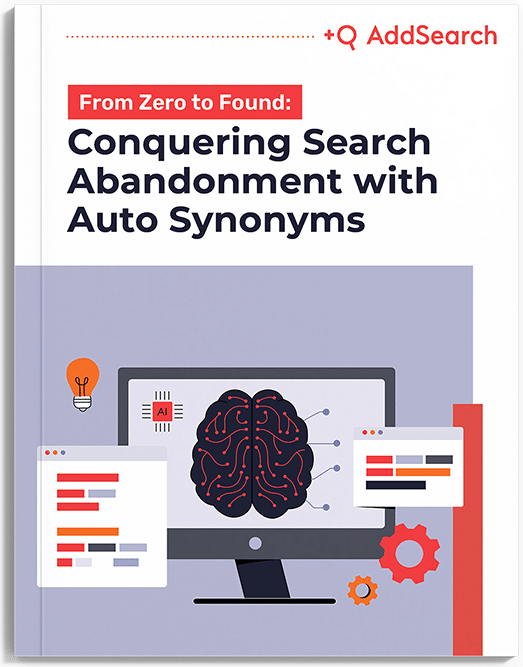As the digital marketplace expands, so does the complexity of connecting customers with the right products. In today’s digital-first world, where 87% of shoppers begin their product searches online, the challenge lies not just in being visible but in being relevant. With online search behaviors becoming increasingly conversational and specific, the traditional one-size-fits-all approach to SEO is rapidly becoming obsolete.
Modern shoppers, equipped with a diverse lexicon, are transforming the landscape of online searches. This shift renders conventional keyword matching inadequate and demands a more nuanced, intelligent approach to SEO – one that not only recognizes but embraces the rich variations in language used by customers across the globe.
In this blog post, we’ll uncover the important role synonyms play in SEO for e-commerce platforms and introduce the concept of Auto Synonyms. This feature from AddSearch isn’t merely a reaction to evolving search trends; it’s a proactive step toward creating a more intuitive and satisfying shopping experience. By doing so, businesses can not only meet but exceed the expectations of today’s discerning digital consumers, who are increasingly turning to online platforms for their shopping needs.

Losing customers to no hit searches? Auto Synonyms helps turn every missed search into a successful find. Learn how in our latest white paper.

The value of synonyms in e-commerce
The use of synonyms in product listings is not just about expanding vocabulary; it’s about enhancing the pathway between what customers are searching for and what your online store offers. They are vital connectors that link customer intent with relevant product offerings.

Consider the diversity in language: a customer searching for ‘sneakers’ might miss out on your ‘athletic shoes’ collection without the right synonym mapping. This scenario is more than a missed opportunity; it’s a gap in understanding and meeting customer needs. Synonyms, therefore, play a crucial role in ensuring that different terminologies, regional language variations, and evolving search trends don’t become barriers to discovery.
Moreover, the strategic use of synonyms can significantly improve the user experience. It reduces the frustration of ‘no-hit’ searches, making the journey from query to product seamless and intuitive. This not only aids in retaining customers but also in attracting a broader audience as your e-commerce platform becomes more accessible and user-friendly.
However, the power of synonyms extends beyond customer satisfaction. It’s also a potent tool for boosting SEO. By aligning your product listings with a variety of search terms, you increase the chances of your products appearing in search results, thereby driving more traffic to your site.
Boosting SEO with synonyms in product listings
Incorporating synonyms into product listings is a strategic move that can significantly enhance your e-commerce platform’s search visibility. This approach targets what’s often referred to as the ‘low-hanging fruit’ or quick wins in SEO – easy yet effective tactics that can yield substantial results. Here’s how synonyms contribute to better discoverability and ranking:
- Expanding reach with low-hanging fruit: Synonyms are like hidden gems in SEO. By including various terms that potential customers might use to search for a product, you capture a wider audience. For example, a clothing retailer adding ‘trousers’ alongside ‘pants’ in their product descriptions can capture a broader audience, including those who use different regional terminologies.
- Enhancing discoverability: Synonyms increase the chances of your products appearing in search results. This is particularly important for long-tail keywords, which are more specific and less competitive. For example, a product listed as a ‘women’s waterproof hiking jacket’ could also be described as a ‘ladies’ rain-resistant trekking coat.’ This variation caters to a broader range of search queries, improving the product’s visibility.
- Improving ranking for niche searches: Search engines favor content that closely matches the user’s query. By using synonyms, you align your listings more closely with specific searches. This relevance can boost your ranking, especially for niche or less common search terms.

Enhancing E.E.A.T with Synonyms in Product Listings
Google’s E.E.A.T framework – which stands for Experience, Expertise, Authoritativeness, and Trustworthiness – is a set of guidelines used to assess the quality of web content. It’s particularly crucial in SEO, as it helps determine how well a site meets users’ needs and expectations. Incorporating synonyms into product listings helps your website better align with these criteria, in the process, enhancing the overall quality and SEO performance of your e-commerce platform. Here’s how:
- Experience: Using diverse synonyms that reflect the varied search terms of customers improves the user experience. It shows an understanding of different customer preferences, making it easier for them to find what they’re looking for, even with varying terminologies.
- Expertise: The accurate and varied use of synonyms in product listings showcases your deep knowledge of your industry. It reflects a comprehensive understanding of the sector’s language and customer behavior, positioning your site as a knowledgeable source.
- Authoritativeness: Providing relevant and comprehensive product descriptions through synonyms establishes your site as an authoritative source in your niche. This authority is recognized by both search engines and users, contributing to higher rankings and increased trust.
- Trustworthiness: Consistent and accurate search results, aided by well-implemented synonyms, build user trust. Trust is a key SEO factor, as search engines favor sites that offer reliable and accurate information.

Examples of E.E.A.T-focused Synonym Usage:
- Fashion Retail: Describing a ‘boho-chic maxi dress’ also as a ‘bohemian long dress’ or ‘hippie-style full-length gown’ demonstrates expertise in fashion terminology.
- Tech Gadgets: A listing for ‘augmented reality headsets’ could also use ‘AR glasses’ or ‘virtual reality headgear,’ reflecting expertise in cutting-edge technology.
- Home Decor: A ‘modular sectional sofa’ can be listed with synonyms like ‘configurable couch’ or ‘adaptable corner settee,’ demonstrating an authoritative knowledge in home furnishings.
Improving your e-commerce platform visibility with AddSearch’s Auto Synonyms
As we saw in the previous section, google prioritizes sites that not only provide content but also provide meaningful engagement and a good user experience. AddSearch’s Auto Synonyms feature plays a crucial role in this context by intelligently resolving ‘no-hit’ search queries, a common challenge that can impact both user experience and SEO performance.
Intelligent synonym mapping for improved search results: Auto Synonyms works by analyzing ‘no-hit’ queries and contextually mapping them to appropriate products on your site. For instance, if a customer searches for ‘trainers’ on a site that only lists them as ‘sneakers’ or ‘running shoes,’ the initial search might yield no results. However, Auto Synonyms will recognize this gap, and by assigning ‘trainers’ as a synonym to the relevant products, it ensures that subsequent searches for the same term are successful.
Enhancing user experience and SEO over time: This feature progressively improves the search experience on your e-commerce site. By continuously adapting to user search terms and refining the internal search engine on your website, Auto Synonyms helps in reducing future ‘no-hit’ scenarios. This not only improves user satisfaction but also positively impacts SEO, as search engines favor sites that provide relevant and efficient search experiences.

Aligning with advanced SEO strategies: Auto Synonyms’ AI-driven approach aligns with modern SEO practices, particularly in enhancing the site’s relevance and authority as per Google’s E.E.A.T criteria. By effectively addressing diverse search behaviors and employing contextual understanding, Auto Synonyms contribute to making your site more accessible and user-friendly, which can boost its ranking in search results.
In summary, AddSearch’s Auto Synonyms feature is a strategic tool for e-commerce platforms. It enhances search outcomes and prevents repeat ‘no-hit’ queries. This functionality is not just about immediate search improvements; it’s about continuously refining the search experience, making it a vital component of a comprehensive SEO strategy.
Application and potential benefits
Imagine an online fashion retailer with a diverse and ever-changing inventory. A customer searches for ‘maxi dresses,’ but the store’s latest collection is listed under ‘long dresses.’ Without Auto Synonyms, this simple discrepancy in terminology could lead to a ‘no-hit’ result, frustrating the customer and potentially losing a sale. With Auto Synonyms, the search engine recognizes the synonym relationship and seamlessly directs the customer to the relevant products.
This scenario illustrates just one of the many potential benefits of implementing Auto Synonyms in an e-commerce setting:
- Enhanced search accuracy: Auto Synonyms bridge the gap between varied customer search terms and the specific language of product listings, leading to more accurate search results.
- Increased conversion rates: By effectively connecting customers with the products they are searching for, Auto Synonyms can significantly boost conversion rates. A seamless search experience reduces the likelihood of customers leaving the site due to unsuccessful searches.
- Improved customer satisfaction: A search function that understands and responds to diverse language nuances enhances the overall shopping experience. Satisfied customers are more likely to return and recommend the site to others.
- Adaptability to global markets: For businesses catering to a global audience, Auto Synonyms are invaluable in managing the linguistic diversity of different markets, ensuring that language barriers do not impede the shopping experience.
- Competitive edge: In a crowded digital marketplace, the ability to offer a superior search experience can be a key differentiator. Auto Synonyms provide an edge by ensuring that your e-commerce platform is not just user-friendly but also linguistically inclusive.

Conclusion
Auto Synonyms marks a pivotal shift in how businesses can approach online search and customer engagement. As search language becomes increasingly diverse and specific, Auto Synonyms stand out as a dynamic, AI-driven solution, adept at bridging the gap between customer intent and product discovery.
For businesses looking to enhance search accuracy, improve user experience, and gain a competitive edge in the digital marketplace, Auto Synonyms offers a compelling answer. This technology is not just about keeping pace with current trends; it’s about setting the stage for future success in a rapidly evolving e-commerce landscape.
As we embrace the future of online shopping, the ability to adapt to changing consumer behaviors and language nuances will be key. Auto Synonyms represent a significant stride in this direction, offering a scalable, efficient, and intelligent approach to SEO that resonates with today’s digital consumers.
Ready to experience the transformative power of Auto Synonyms for your e-commerce platform? We invite you to try a live demo and see firsthand how AddSearch can enhance your search functionality, improve customer satisfaction, and drive your business forward. Request your demo today and take the first step towards redefining the online shopping experience.
Experience the Best in Search Solutions with AddSearch – Top Rated on SourceForge! Click for Your Free, Personalized Demo Now.










